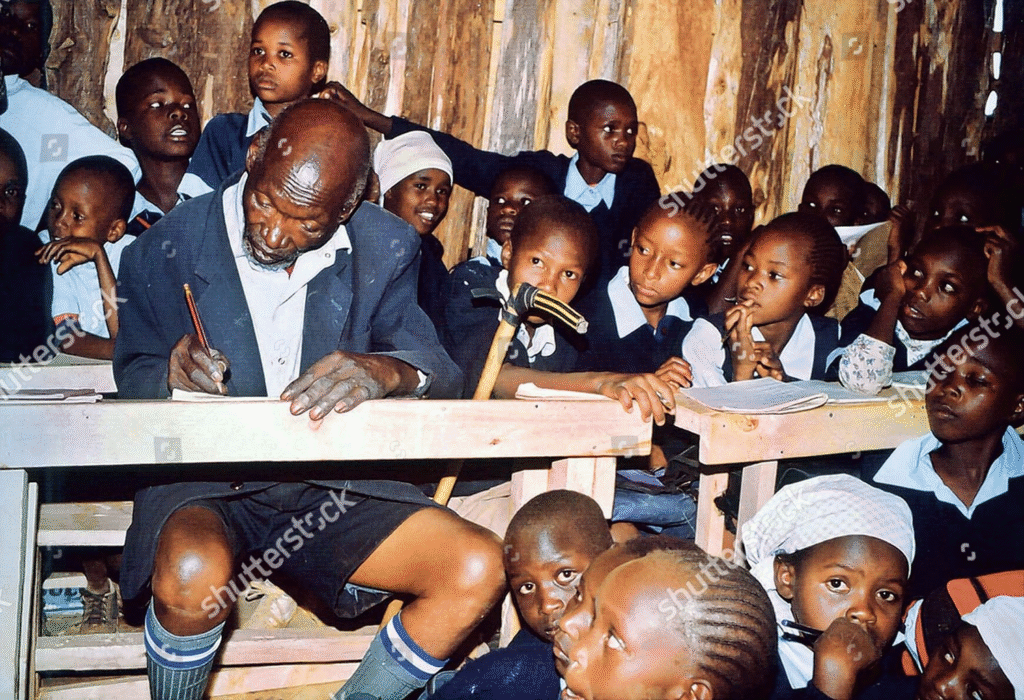In January 2004, a barefoot octogenarian walked into Kapkenduiywo Primary School in Eldoret, carrying a Bible, a walking stick, and an unshakable dream. His name was Kimani Ng’ang’a Maruge, and at 84, he was determined to start the education he had been denied his entire life.
Born in 1920, Maruge came of age under British colonial rule, when schools were designed for obedience, not enlightenment. Education for Africans was scarce, racially stratified, and often reserved for those willing to serve the colonial state. Like many young men of his generation, Maruge turned instead to rebellion. In the 1950s, he joined the Mau Mau uprising, part of the great movement that sought to reclaim land and dignity from an empire that refused both.
(The uprising’s wider story is explored in the history of the guerrilla war that reshaped Kenya’s path to independence.)
A Promise Deferred
Decades later, as independence dawned and the long years of struggle faded into the past, Maruge’s dream of reading and writing remained unfulfilled. The daily battles of survival — tilling land, raising a family, rebuilding from loss — had replaced the classroom. Yet, the spark never died.
In 2003, when President Mwai Kibaki announced the Free Primary Education policy, it ignited a national wave of hope. For millions of children, it meant the opening of doors once locked by poverty. For Maruge, it was a second chance. He walked to his local school and asked to be admitted to Standard One, becoming the world’s oldest pupil.

The school uniform fit awkwardly, the bench felt small, and the letters came slowly — but the determination never wavered. He wanted, above all, to read his Bible unaided, to write his own name, and to count his money without dependence.
(The social awakening that made Maruge’s story possible grew from the civic reforms and post-independence vision that leaders like Kibaki championed, part of the evolution chronicled in the account of Kenya’s modern political transition.)
A Nation Learns from Its Elder
The sight of an elderly man in a classroom stirred curiosity, skepticism, and then admiration. Some parents wondered if his place belonged to a child. Others dismissed it as a stunt. But when the radio stations picked up the story, and newspapers ran his photo — the old man hunched over a desk among children — Kenya saw something profound: a living lesson.

Maruge’s story broke beyond borders. CNN and BBC told it as a tale of determination; Al Jazeera and Reuters called it a miracle of willpower. He became a symbol of the human right to education, traveling to New York in 2005 to address the United Nations Millennium Development Summit. Speaking in Kiswahili, he declared that learning is not a privilege of the young or the rich — it is a birthright.
His message echoed the postcolonial call for equality that Kenya’s early reformers had voiced in the 1960s — the same spirit captured in the reflections on national identity and civic growth in Kenya’s post-independence journey.
The Scholar Who Never Quit
Even after being displaced during the 2007–08 post-election violence, Maruge refused to abandon his books. He continued his education in Nairobi, eventually reaching Standard Six before illness slowed him down. In 2009, he died of stomach cancer — a national loss marked not by silence but by reverence.

Maruge was posthumously honored as a patriot. His name became a metaphor for perseverance — invoked in classrooms, sermons, and civic speeches alike. In 2010, his life inspired the film The First Grader, introducing his story to audiences far beyond Kenya.
(His courage under hardship recalls the endurance of other unsung heroes who rebuilt Kenya’s social fabric after conflict and upheaval.)
The Lesson That Outlived the Student
Kimani Maruge left behind no mansion, no wealth, and no title — only a story powerful enough to outlive them all. His journey became a parable for a nation still wrestling with inequality: that education is freedom, and that age, poverty, or circumstance can never revoke the human right to learn.
In every adult classroom across Kenya, in every mother or farmer who picks up a pen after decades of silence, his legacy lives on. Maruge taught that courage is not found only in rebellion or politics — sometimes, it sits quietly at the back of a classroom, spelling out its first word.





